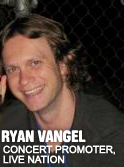Q&A WITH RYAN VANGEL (CONCERT PROMOTER FOR LIVE NATION)
posted in: Features
 Live Nation concert promoter, Ryan Vangel began his career working as a runner for regional promoter the Don Law Company. Through a succession of acquisitions Don Law became part of Live Nation- where Vangel continued to work up the ladder- promoting 300 shows a year in clubs, theatres, arenas and amphitheatre.
Live Nation concert promoter, Ryan Vangel began his career working as a runner for regional promoter the Don Law Company. Through a succession of acquisitions Don Law became part of Live Nation- where Vangel continued to work up the ladder- promoting 300 shows a year in clubs, theatres, arenas and amphitheatre.
OurStage recently sat down with Vangel and asked him questions pertaining to his job as well as advice he has for bands. His responses are solid gold.
KB: What does your job as a concert promoter entail?
RV: The job of a concert promoter is helping bands grow from the smallest clubs up to stadium bands. Obviously not all bands do that and a lot depends simply on the basics of songwriting and treating your fan base well. As a promoter I guarantee the acts a certain amount of money and book a mutually agreeable show at a venue. I then must handle the marketing, ticketing and production of the show with a team of people to make sure it is a success for everyone involved.
KB: How did you get started in the music industry?
RV: I actually did a 6 month internship in London at a promoter called Metropolis Music- who at the time were small but now are one of the major promoters in the UK. From there a succession of jobs at small management companies, agencies and festivals until I was hired at Don Law Company in 1998.
KB: How has your aspect of the industry changed over the last few years?
RV: When I started the company was a private regional independent company and now we are part of a global company. The business now seems bigger in many ways. More and more acts book an entire tour with one promoter for the whole world where in the past each date had a different promoter. In the club world it is still pretty much same as it always has been with regional clubs booking acts into their venues in a specific market.
KB: Is there a place for independent artists when it comes to the scale of concerts you produce?
RV: Absolutely, with the selling of music declining more and more acts are either releasing music themselves or signing to small indie labels. Some of the biggest acts like Pearl Jam, Radiohead, etc. are either self-releasing music or partnering with retailers to help distribute music they own. So for concerts in clubs and theatres nowadays a large percentage of headliners are indie bands who have developed large followings by touring consistently and writing great music that top-40 radio maybe wouldn’t ever play.
KB: Can you give me some examples of current indie artists whose fan base justify inclusion on national tours, major festival and/or premium venues?
RV: The list is huge. Half the artists on Merge, Matador and Sub Pop dominate festivals nowadays. Vampire Weekend, Fleet Foxes, Band Of Horses, Arcade Fire, Silversun Pickups. I’d say about half the lineup on major festivals are bands on indie labels.
KB: What’s your advice to artists when it comes to gigging?
RV: It really comes down to the music. Do you have music that is honest, compelling and well-written? Does it make people feel something when they hear it? Once you have songs, the rest is just basic logic. Play the best show you can. Treat your fans who support you special- give back to them when you can with either fan club appreciation shows or free CDs, t-shirts, anything that makes them feel part of a family. Those fans will be the ones who go out and tell everyone they see about your band and drag them to shows. On a practical level, don’t overplay a market, every 6 months tops if you are above the local 1st of 4 on a Tuesday level.
KB: When it comes to building a fan base in a particular market- what do you consider the tipping point in terms of draw?
RV: I always encourage bands when they are at the point where they are a headliner to play shows so you sellout and leave people outside, unable to get in. I think under playing a bit is always a great idea to build your audience as the people shut out will be the first ones to buy tickets when you play again. That builds up the band’s ability to sell advance tickets which makes promoters and venues happy and more willing to take a chance on the next time in a bigger venue. By doing that I think you grow faster. At some point where you’re selling out 600 capacity rooms you go for it and try playing a 1000 cap room. Push it as hard as you can and see what happens.
KB: What is the one thing you wish bands realized when it comes to booking or playing live?
RV: You can’t play every 3 weeks if you ever want to grow beyond a local band. I have seen great bands play weekly gigs for years and they can’t figure out why they aren’t growing their fanbase. In the beginning play as much as you can to get stage presence and practice but once you start getting a fanbase space at your plays more and more to build demand for people to want to see you. If you play every week there is no excitement.
Amen, Ryan. Amazing advice for working musicians. Thanks for sharing it!
